Jennifer Cohen's Unlikely Path to the Top of College Sports
Two days before the Washington Huskies’ scheduled football opener on Sept. 5, Jennifer Cohen strolled through the university’s athletic complex, with peaceful Lake Washington looming like an oil painting in the background. As she wound by the basketball arena, past the football stadium and down to the docks where champion rowers once climbed into their boats, she was, more or less, alone. Instead of bat cracks, blown whistles and shouting coaches, an eerie silence hung heavy in the air. Instead of teams preparing for fall seasons, the fields sat empty; in some cases, grass was overgrown and benches were covered in bird droppings.
For Cohen and other athletic directors throughout college sports, the past six months have unfolded like an unending crisis management exercise. It’s not just the pandemic. It’s the seasons that were shut down last spring, the classes canceled, the campuses cleared, the testing protocols established, the plans that required careful consideration for a safe return. It’s the police brutality that shook not only her athletes but her staff, the protests and demonstrations that continued nearby in downtown Seattle. It’s the mental wellbeing of everyone she knows. It’s the ongoing debate about amateurism and compensating college athletes. It’s the staff she had to furlough, the budgets she was forced to cut and the opener—against mighty, revenue-generating Michigan—that UW will not play this season.
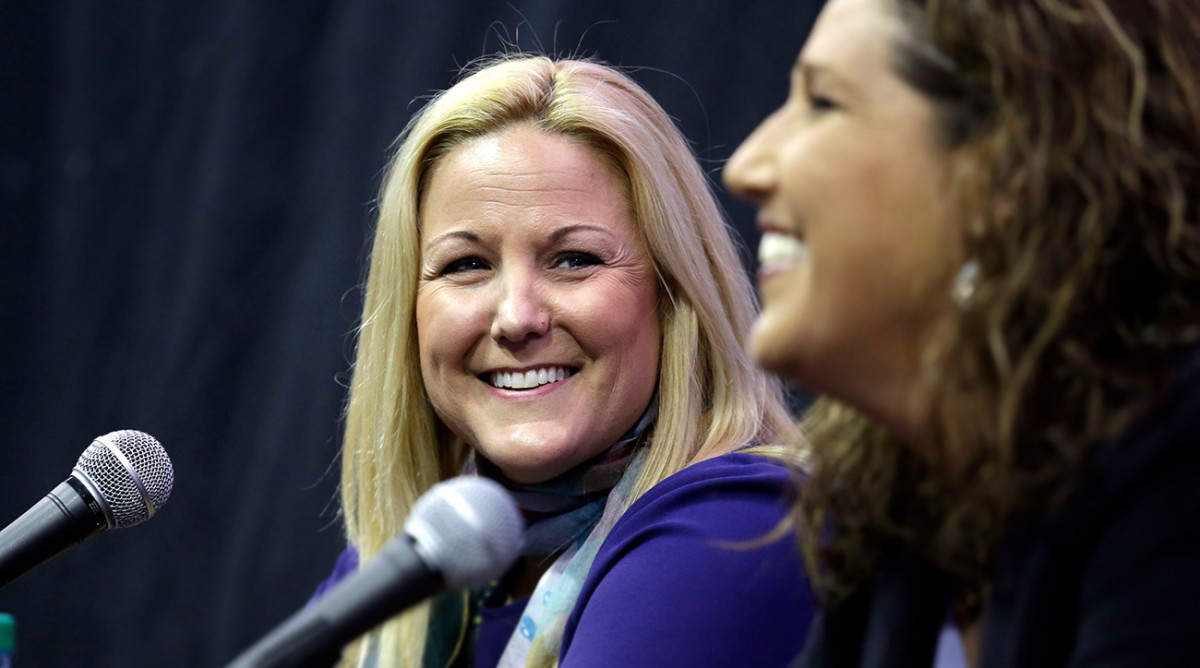
Birds chirped nearby as Cohen wandered, and how clearly she could hear their calls spoke to the new landscape, the difference between the normal bustle and a college sports ghost town. Where most of the world paused or scaled back for COVID-19, Cohen’s already overstuffed work docket only grew. Her phone buzzed endlessly. Administrators weighed the contract the conference had signed that day for rapid testing, speculating on whether that could speed up a return. Rather than host a football game, she would take her oldest son across the country to college that weekend. Her youngest needed a ride to his high school football practice. Everyone needed something, which made Cohen at once an administrator, confidant, therapist, budding amateur medical expert, mom, fundraiser, Uber driver, activist and air traffic controller.
Cohen is also, always, one of only five female athletic directors at a Power 5 school, which never really mattered to her until recently. It does matter now, though, especially in 2020, when both her unlikely path to the top of college sports and all she lived through simply because she lacked a Y chromosome will inform how Cohen approaches the unprecedented uncertainty at hand. She understands chaos, after all, because she long ago became familiar with it.
To deal with all her new and strange responsibilities, Cohen and her red fox Labrador walk roughly 10 miles every day, sometimes more. Big Red remains both her trusty companion and her sounding board. As Cohen settled onto a purple yoga mat for her morning workout, he plopped down at her side, her phone and her dog always within reach. The AD sped through the closest thing to actual athletic competition on her empty campus, playing Ariana Grande and laughing about Snoop Dogg’s foray into wine. “I actually slept really well for the first time in a long time last night,” she says, mid-plank.
It’s Superset Friday for Cohen and her workout crew, and that means a cycle of burpees, in-and-outs, speed skaters, hammer curls, mountain climbers and something called a skydiver. The last movement doubles as what it feels like Cohen does when she wakes up every morning.
****
After the Cohens moved from San Diego to Tacoma, Wash., in the 1970s, Dennis Smith purchased season tickets in the end zone of Husky Stadium. He and Jen soon settled into their fall Saturday routine. The Cohens would drive north to campus, park near the arboretum and walk across the Montlake Bridge into a setting as picturesque as anything in sports. Inside, Jen would sprint to the front row and beg for wristbands, while barking—WOOF! WOOF! WOOF!—at opponents in the nearby tunnel. At halftime, they ate polish dogs. When it rained, they wore garbage bags over their clothes.
Those Saturdays helped a young girl fall in love with college sports in general and Washington football in particular, her passion intensifying until she started penning letters to Husky coaches. She wrote the legend, the Dawgfather himself, Coach Don James, saying she wanted to eventually replace him. James wrote back, dismissing that quest as improbable but noting that there were more opportunities for women than ever in college sports. The fifth-grader took no offense to the less-than-PC response. Whatever else James said, no matter how few women actually lived the life she wanted, none of that mattered. Her hero had told Cohen there was a chance—and a chance was all she needed.
Gender did not shape, or factor into, Cohen’s quest initially. Failure did. As a senior, she ran for president at Curtis High, losing to a classmate named Mark Sievers who was overseas during the election and won without giving a speech. She applied to UW, chasing childhood fantasies, only to be waitlisted. She graduated from San Diego State, earned her master’s degree from Pacific Lutheran and began her march toward the top of college sports as a … glamorous … celebrated … Division III volleyball coach. “I was,” she admits, “terrible at it.”
Cohen swept floors and fixed shot clocks. She slept in church basements, split bagels for breakfast and drove vans for hundreds of miles into inclement weather for games with no fans, long before crowd sizes were restricted. She became the de facto strength-and-conditioning coach. And the staff nutritionist. And she wrote to Division I athletic directors, begging for a meeting, asking for informational interviews that might crack open doors long closed. No chance, they almost universally responded, if they even responded at all.
With no gatekeeper and little pedigree, all the more typical paths to becoming an athletic director (her dream) remained closed. Rapidly approaching 30 and concerned about her future, Cohen left behind her husband and moved to Lubbock, Texas, to become an intern in the Texas Tech athletic department in the mid-90s. Cockroaches scrambled across the floor of her cramped apartment, multiplying until she took to vacuuming them up en masse so she wouldn’t have to touch them. Her life possessions at that point consisted of a TV, a futon and the bug-vac. She had never been to a press conference before. But she stayed. Learned. Climbed. Vacuumed.
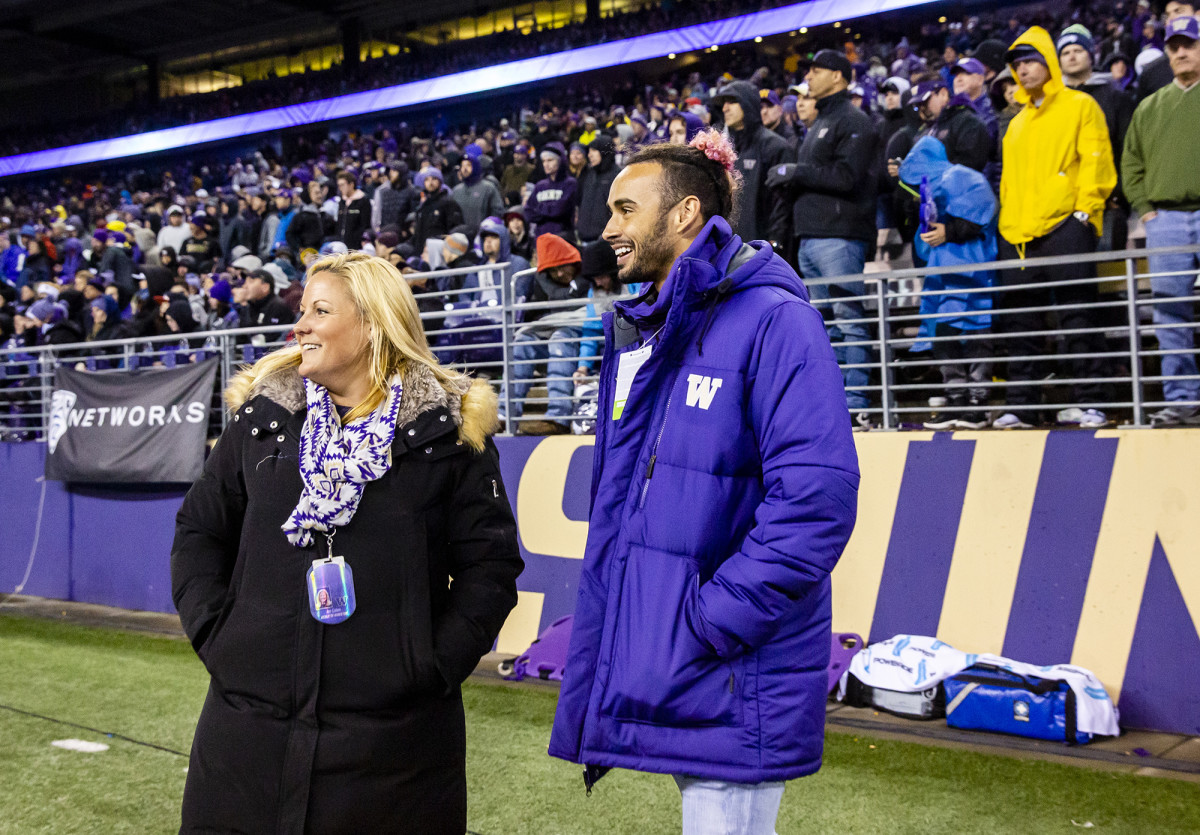
Because her then husband was a youth baseball coach … and because he introduced Cohen to an influential UW baseball donor named Herb Chaffey ... and because Chaffey decided to throw his heft behind a lifelong Husky who just happened to be female … Cohen landed her dream job in the Washington athletic offices back in 1998. Even then, Barbara Hedges, the school’s female AD, wondered about Cohen’s qualifications.
Cohen’s father wrote Jen a letter as she settled into her office near the stadium where they once sat together on Saturdays in the fall. It read, in part, “Remembering you at the tunnel.” Tears rolled down her cheeks. She loved Washington athletics as much as anyone loved anything, and one day, she hoped, she would follow Hedges into the school’s top office.
****
Cohen never left. But as she began to cement her reputation as an ace fundraiser, others began to qualify her accomplishments, making her an ace female fundraiser and the rare woman to work at the highest levels for a major college program. Maybe she didn’t care about her gender, but that didn’t mean she could escape such outdated and obstinate notions, either. She could only roll her eyes when someone said Saturdays were “for the boys.”
With office dynamics, especially in regard to conflict resolution, she couldn’t win. If she cried or expressed emotion, she was too vulnerable, too womanly, too weak. If she yelled and screamed, swore and pounded tables, she was too aggressive, a real “b----.” Men she worked with constantly shushed her; one asked her to fetch him ice cream. Donors mistook her for a coach’s wife, or, worse, a player’s mom. Some tried to intimidate her. One wrote saying that he figured Cohen would fail in a department the size of Washington’s, because he didn’t like Hedges, who ran things in a gruff, no-nonsense style and represented more of a contrast to Cohen than an apt comparison. “Wow, people only see me as a woman,” Cohen thought. She wrote the donor back, saying she was curious about the comment when she and Hedges shared so little in common beyond their gender. The donor never responded.
Cohen figured that eventually, attitudes would change. But even in more recent years, she’s found that they largely have not. When she studied the handbook for conference athletic directors, she saw a coat-and-tie suggestion for public appearances, meaning the rule seemed written with only one gender in mind. When she said administrators needed to listen to Black students this spring, one donor name-called her #MeToo, mixing up movements in the least graceful way possible. Another season ticket holder, angry over donation requests from a department with delayed seasons, tapped out an ignorant email, telling Cohen to “suck it up, buttercup.”
After years of similar interactions, Cohen came to realize that an authentic approach worked best. She could not change what people thought of her gender. But she could embrace the parts of being a woman that made her better at her job. Like, for instance, the two decades she spent as a mom, balancing two kids and an 80-hour work week. Her boys taught her empathy and helped her see the decisions she made from the perspective of parents. Tyson, her oldest, became a kindred spirit, thoughtful and driven and prone to telling off the wayward fan on social media or crying during movies. Dylan, her youngest, was more private and rarely expressed emotions, preferring to hunt, fish and play football. She would take different routes to reach them, same as with her athletes.
So many focused on who she wasn’t and who she was supposed to be, rather than who she actually was and is. Friends describe Cohen as loud, gregarious and a free hug dispenser (pre-COVID-19, anyway). She’s smart and capable and one of the top administrators in the country. She doesn’t have to apologize for any of that and doesn’t plan to. And yet, from ’98 to 2016, as she became an important voice at the one place she loved the most, she still considered herself an underdog, unworthy in some respects, searching for someone who believed in her more than she believed in herself.
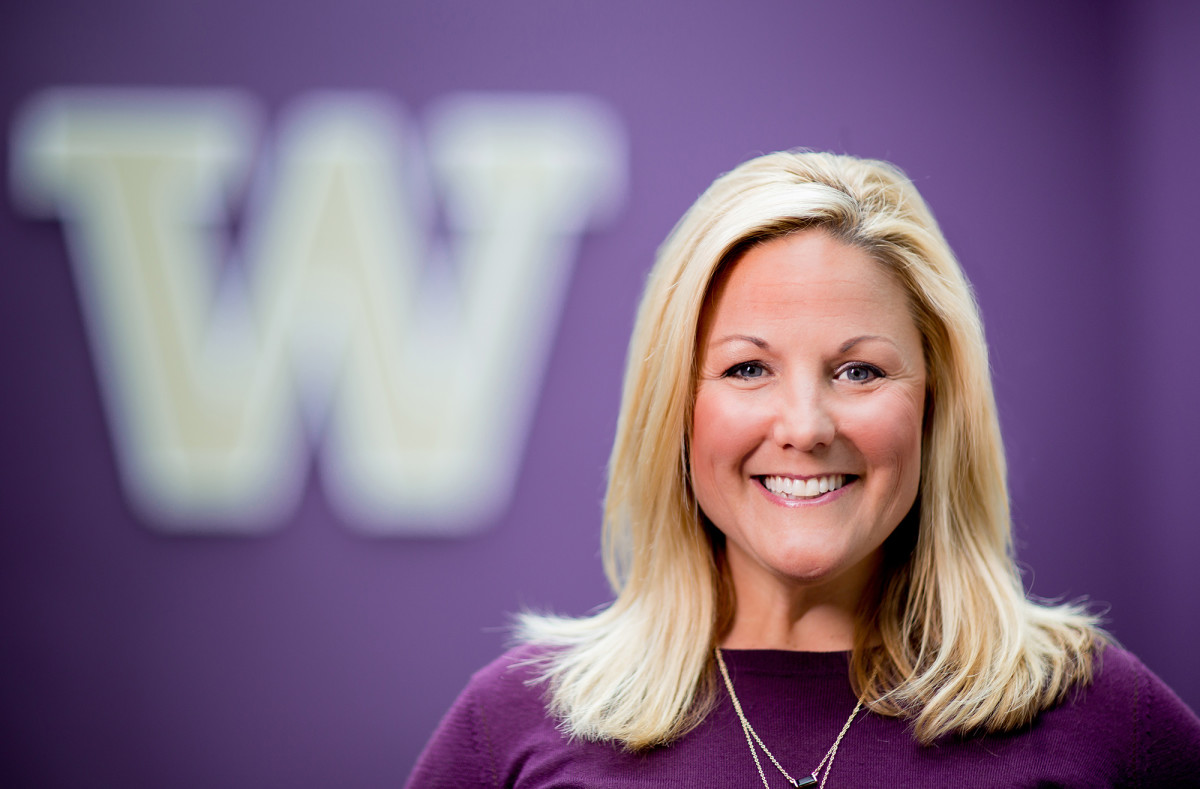
****
That person was Stephanie Rempe, a longtime UW athletics employee who’s now the COO in the athletic department at LSU. Cohen isn’t exactly sure why Rempe said anything to her. Perhaps Rempe could sense Cohen’s fear, her deepest doubts. That she couldn’t do the job, that she wasn’t the person that these people, this system, this entity, wanted. Regardless, Rempe looked her straight in the eyes in ’15 and told Cohen, “You know you can do it, right?”
Cohen nodded, unconvincingly.
Rempe continued: “Not only can you do it, but you owe it to us to do it.” Meaning, become an athletic director of a major program. Not a female AD. Not a b----y or sensitive AD. Just an AD, the job that Cohen still coveted after almost two decades at UW.
Cohen says she never doubted her qualifications again after that conversation. She had already helped Washington land Chris Petersen, the highly regarded football coach. Petersen didn’t know of Cohen when the Washington contingent flew to Boise for an interview, but he quickly realized that she connected with and understood people “better” than anyone he’d ever met. When coaches applied for assistant positions, Petersen would ask Cohen to meet with them, and he rejected some applicants based on her reads, which weren’t always the same as his. He began to refer to Cohen as his problem-solver, and when Scott Woodward left the AD position for the same job at Texas A&M, Petersen recommended strongly that administrators choose Cohen to replace him. Reading people was her superpower, Petersen told the UW brass.
Washington promoted Cohen to interim athletic director in ‘16. You were built for this, she continued to remind herself. Then she proved her constitution beyond even the most optimistic expectations. She started with the strategic planning exercise known as a SWOT analysis, brainstorming ideal Huskies and what they represented until her team had clearly defined the culture they wanted to create. She asked the coaches in nonrevenue sports what they needed to continue winning championships. She erased the $15 million deficit she inherited, continued fundraising and pumped the additional cash and growing TV money into facility renovations. Petersen laughed at the interim tag. Like, he says, “Wait, what are we talking about here? Just hire her already.” The school made her the permanent AD after a few months.
Defining what she wanted and finding the necessary resources helped Cohen conquer the most vexing paradox in college sports: that the stakeholders, from donors to coaches to athletes, always stand both next to and in direct conflict with one another. Cohen asked herself: How can I align them? She decided on a service orientation and growth mindset strategy. Focus on the people, more or less, give them what they need to win, support their mental health and watch the wins roll in. Petersen gave Cohen a book, The Advantage, which highlights organizational health as the primary driver for successful businesses, and she applied those principles to her plan. “I didn’t try to manufacture some bulls--- that isn’t what this place is,” Cohen says. “I just took what’s already special and put it in high definition.”
The UW Board of Regents recognized Cohen’s business acumen, how she told them the truth, even in uncomfortable moments, how she cared about her athletes and raising money and winning games. One such regent, Patrick Shanahan, who served as the acting U.S. Secretary of Defense last year, says Cohen didn’t rationalize or make excuses for any issues she inherited. “We have a saying in the military,” he says. “She ran toward the sound of gunfire.”
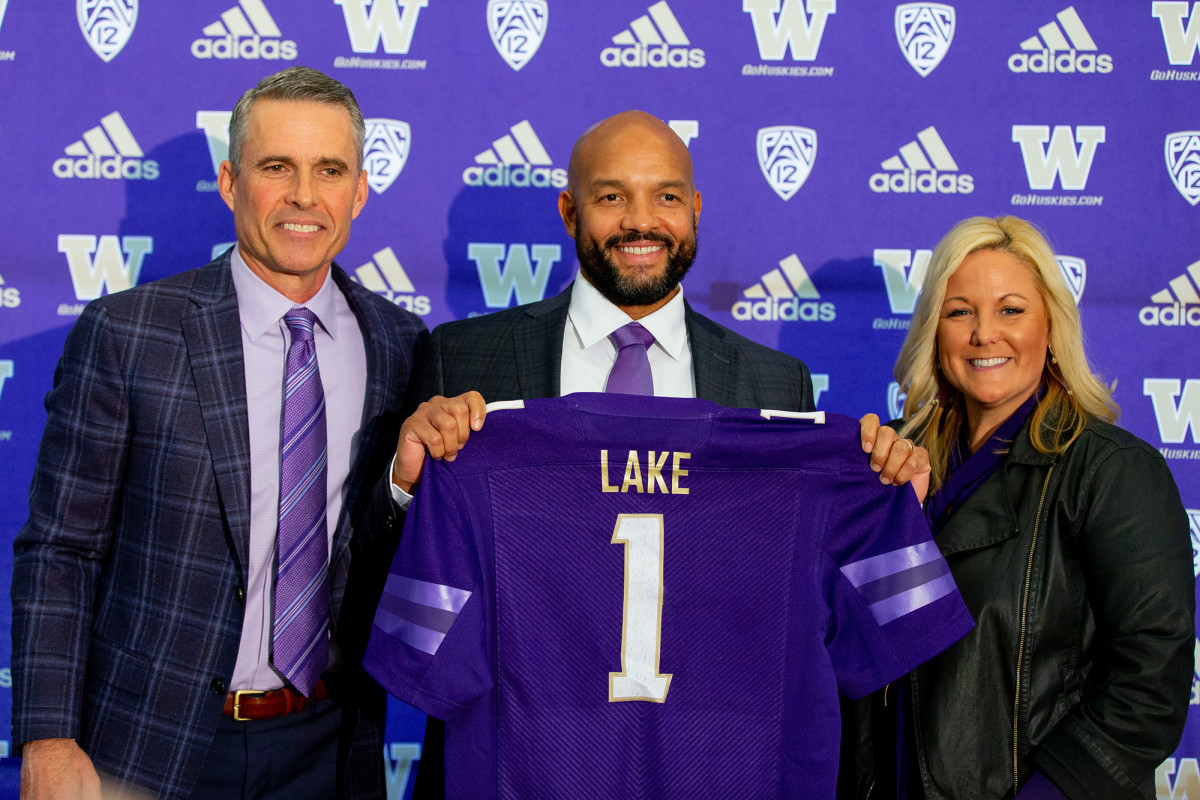
Cohen made unpopular decisions, like firing beloved basketball coach Lorenzo Romar after the 2016–17 season and replacing him with Mike Hopkins, a talented outsider from Syracuse who wasn’t well known on the West Coast. Three of her first five new coaching hires—Hopkins; Yasmin Farooq, women’s rowing; and Elise Ray-Statz, gymnastics—won conference coach of the year honors in their respective first seasons. The football team compiled the highest APR in the country and made the Fiesta Bowl, the softball team surged to the Women’s College World Series final, the baseball team advanced to the CWS for the first time, both rowing teams finished second nationally— and all that was just 2017–18. Meanwhile, Cohen helped coax Jimmy Lake, the prized football assistant, to remain on staff, and when Petersen stepped down for personal reasons in December, his top lieutenant was available to elevate. Amid all that winning, Cohen landed the school a 10-year, $119 million deal with Adidas, quadrupling the previous agreement with rival Nike, good for the fifth-highest contract in the nation based on yearly average and second-most in the Pac-12.
Hopkins could empathize with his new boss, as both had stood thisclose to their dream jobs, showed patience beyond any sane expectation and planned for moments decades in the making. Cohen, Hopkins says, has stood by him through the ups and downs: when locals pushed back against the hire, when the Huskies upset top-ranked Kansas on the road and when UW lost nine-straight last season. “That consistency makes her one of the top athletic directors in the country,” he says.
Anyone who still focused on Cohen’s gender missed the transformation of UW athletics, according to Coach Pete. “People can make a big deal about her because she’s female in this male-dominated arena. To me, that was never the point,” he says. “But also, maybe it is?”
***
Something unexpected happened after Cohen rose to her position of prominence. Someone unexpected, actually, came to embrace her own ability as it related to the importance of prominent women in sports. That person was once a skeptic of that very concept.
Her name: Jen Cohen.
The change started with a phone call from her friend, Patti Phillips, CEO of Women Leaders in Sports. Phillips wanted Cohen to understand the magnitude involved, and she focused on emotion, on change, on the little girls who sat in the end zone just like Cohen used to and cheered for men. Cohen wasn’t just any employee, Phillips reminded her. She was in charge, and she had earned her lofty perch and the power in her position.
For years—for her entire life, really—Cohen had resented the notion that she was a female anything, let alone some sort of pioneer. But she came to understand that by discussing her experience, by explaining what needed to change and how that change might occur, she could open the kinds of opportunities that did not always exist for her. To ignore the gravity or the potential would be irresponsible, she says.
The pivot didn’t seem like much at first. But then, whenever Cohen gave talks, or met with business leaders, she noticed lines stretching out of doors, woman after woman after woman who wanted to share their own struggles and stories and stereotypes shattered. They wanted to share what Cohen meant to them. They saw her bottom-feeding base salary—at $460,000 annually, plus incentives, second-worst in the Pac-12—and saw UW recognize her impact and nearly double her compensation to $750,000.
As Cohen flew to Las Vegas in March for the Pac-12 men’s basketball tournament, it seemed like everything she had fought for had fallen into place. For a day or two, anyway.
****
Jen Cohen, female leader, athletic director in the Year of the Chaos, believes her teams, her coaches and her athletes need her authentic approach to leadership more than ever now. She can’t imagine what it’s like to be a college athlete, dream on pause, ample resources suddenly unavailable, worried about Black lives, interrupted passions, a formidable virus and the long-term impacts of all those things swirling together all at once. She knows what it’s like to be their parents, dealing with all that uncertainty, unable to discern an acceptable level of risk.
From the minute that officials canceled that Pac-12 tournament, Cohen and her counterparts entered crisis mode. And they remained stuck in that hell until recently, when on Sept. 24, the Pac-12 ended the six-month shutdown and announced the return of competition, including an abbreviated, seven-game football season set to begin the weekend of Nov. 6–7.
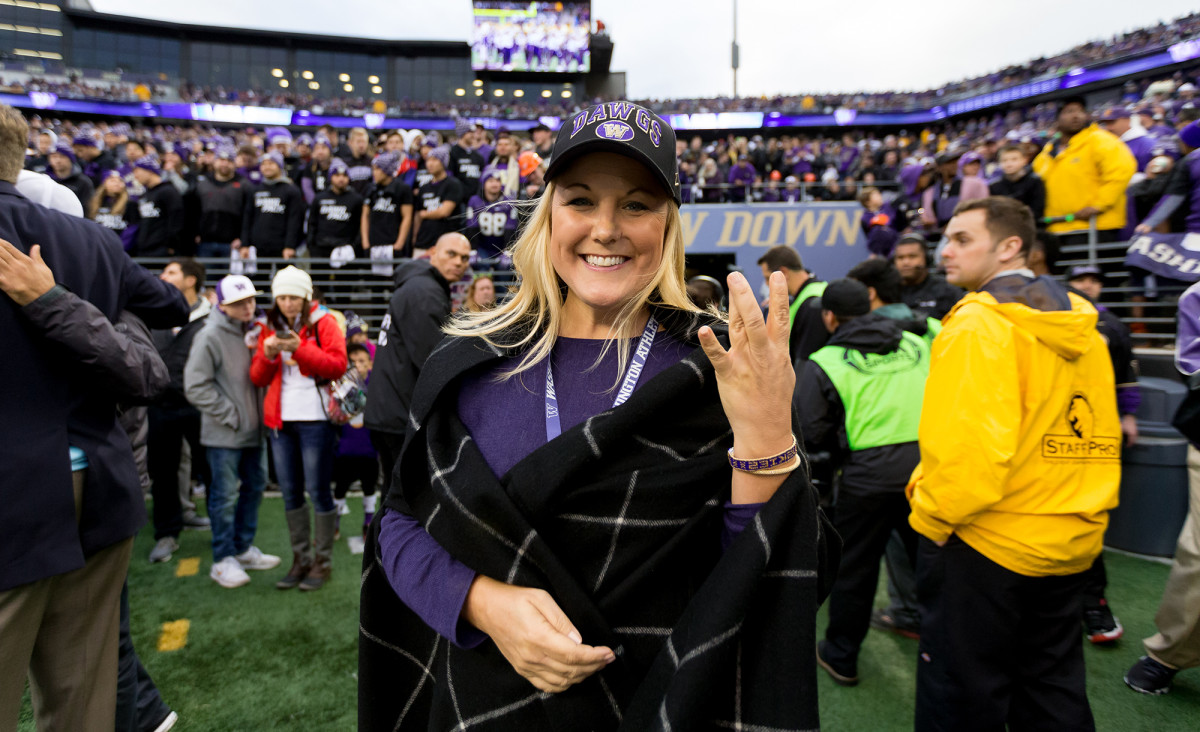
Cohen must be everything. She must stand up for the rights of Black staff and Black students and organize calls so that they can feel heard—and so their white counterparts can hear them. She must diversify her staff and create a new fund geared toward more inclusion. She must organize weekly meetings with coaches, so that they can brainstorm strategies and share tips for favorite leadership books, recruiting techniques and how to handle the tsunami of 2020. She must create a fund that funnels $50,000 toward her athletes’ mental health needs.
She must reassure her fans but holds little to reassure them with. She must trim roughly $28 million from her budget. She must introduce cost-saving measures: 5% pay cuts for head coaches and 3% for their assistants through June 30 of next year, furloughs for 2–4 weeks for 156 staff members, no filling of vacant positions, the elimination of 16 jobs and $8.5 million in savings (15%) from her operating budget.
Cohen must also confront dwindling revenue, the lack of a football gate (projected loss: $44 million) and the usual influx of TV cash. She must consider the so-called nonrevenue sports, many of which have proud traditions, and how reducing the operating budget will impact teams with already razor-thin margins.
On top of all of that, she must be both unconcerned with gender and forever championing I am woman, hear me roar. She can’t win—and she can’t stop winning.
It’s a lot, all of it, everything, in a job that Petersen describes as both tough and miserable and the one position I knew I never wanted. “I will be honest,” Cohen says. “There are a lot of things we aren’t doing well right now. But I have people who are furloughed, and where I refuse to compromise is with our ability to support our students.”
Instead of playing host to donors while Huskies smashed into Wolverines on a perfect late-summer weekend at the stadium on the lake—“gut-wrenching,” she says—Cohen flew east, without Big Red. With her oldest, she drove through another storm battering South Carolina. Her phone continued to buzz as if stuck on some sort of permanent vibrate while she tried to see through rain that fell in heavy sheets outside Greenville. Through the deluge, she sometimes spied flash flood warnings. They blinked odd and yet important phrases like TURNAROUND, DON’T DROWN, and she could only laugh, because those cautions spoke not only to her trip but to all of 2020, too.
For more from stories on the most powerful, most influential and most outstanding women in sports right now, check out Sports Illustrated's series The Unrelenting.
